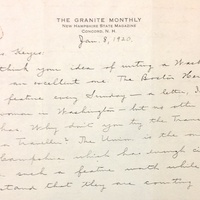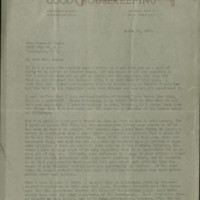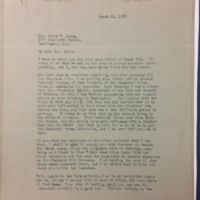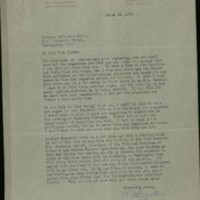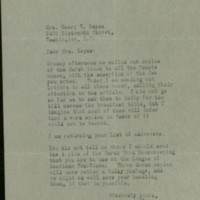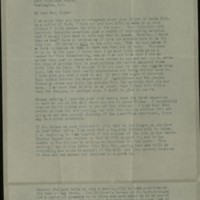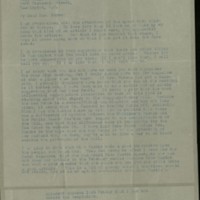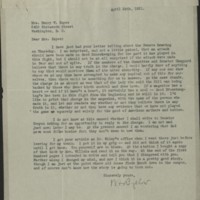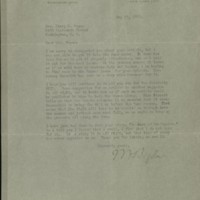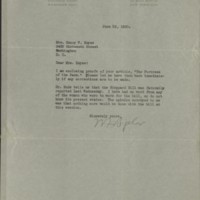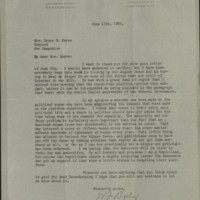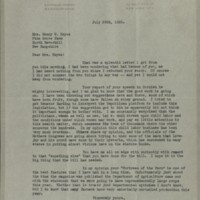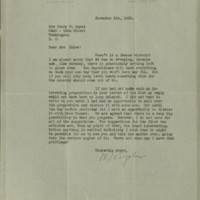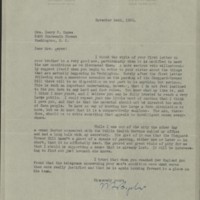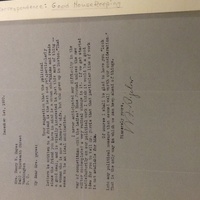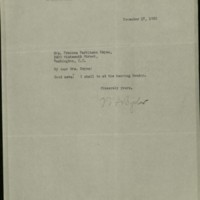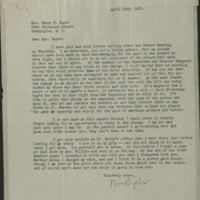Capitol Kaleidoscope : Sheppard-Towner
At the top of the Woman’s Platform was the passage of the Sheppard-Towner Maternity and Infancy bill, which would allocate tax revenue to promote the health care of mothers and infants. An umbrella organization of women’s groups called the Women’s Joint Congressional Committee (WJCC), led by Maud Wood Park, coordinated the work of the WJCC. Among the first ten organizations to join the WJCC were the League of Women Voters, the Daughters of the American Revolution, the General Federation of Women’s Clubs, and the National Consumers’ League. Florence Kelley of the Consumers’ League led the lobbying effort for the bill. Ladies’ Home Journal called the WJCC the “most powerful lobby in Washington.” [1]
The story of Keyes’s involvement in the lobbying effort for Sheppard-Towner is a crucial chapter in the larger narrative of her evolution as a writer. It gave her political experience and widened her circle of activist women friends, many of whom were, like Keyes, balancing work, family, and political activism. It also marked the beginning of her long association with Good Housekeeping magazine and its editor William Frederick Bigelow. Good Housekeeping was one of the “Big Six” women’s magazines of the era and under Bigelow’s editorship it advocated for women’s education, the expansion of their occupational opportunities, and legislation to make workplaces and homes safer and healthier.
On March 18, 1920, Bigelow asked Keyes to take a role in his effort to pass what became a groundbreaking piece of legislation on Capitol Hill. The bill in question would survive the legislative process to become a landmark in the history of social welfare in the United States. Known today as the Sheppard-Towner Maternity and Infancy Act, it was “a link in a chain of ideas and actions from Roosevelt to Roosevelt, which began with the White House Conference on Child Welfare Standards in 1909 and ended with the Social Security Act of 1935.” [2] Bigelow was certain that such a bill would pass, since it was intended to address the pressing fact that as a nation the United States of America ranked seventeenth worldwide in maternal mortality and eleventh in infant mortality, according to a study conducted in 1918 by the United States Children’s Bureau.
Bigelow also understood that the complexities of the American political climate in the early 1920s meant that the Sheppard-Towner bill faced significant resistance and intense lobbying was necessary for its passage. Keyes, Bigelow believed, was in a remarkable position to exert influence over the legislative process in Washington. Encouraged by her positive response to his first letter asking for assistance, Bigelow told Keyes on March 22, 1920 that “it seems like we are on the road to a most amicable understanding, and I, for one have great hopes for the future.” The letter then got down to practical matters. After rhetorically asking who has “more influence with a Senator than his own wife,” Bigelow wrote, “All that is left is to get the Senators’ wives interested, and I am sure that you can do that.”
In his “What the Editor Has to Say” column in the previous month’s issue of Good Housekeeping, Bigelow wrote about Sheppard-Towner for the first time, telling readers that the Children’s Bureau’s “damning and heartbreaking statistics” proved how “vital” this legislation was and how it should “touch the heart of every man in Washington.” And, yet, he concluded, “politicians are expecting to wait with this bill until the women of the country make an issue of it” and it will only “pass now if women say it must.” [3]
Writing articles to educate women about the bill went hand in hand with its lobbying effort. Until it was finally passed, Bigelow dedicated the majority of his “What the Editor Has to Say” column to arguing for the relevance and importance of the bill, giving updates on its progress, and introducing readers to the bill’s supporters. In “nearly every instance,” he wrote in March 1920, a “promise of cooperation was given as soon as the situation was explained.” Keyes was one of many who promised to cooperate in the call to action. Her first task was to use her connections to lawmakers’ wives and convince them to talk their husbands into voting “Yes” on the bill.
The correspondence between Bigelow and Keyes indicates that she did very effective work. “You have made an exceedingly good beginning,” Bigelow wrote Keyes on March 25, “and you shall have all the magazines you want and any other assistance that I can give you from this end.” He asked her to check the Congressional Directory “and check off any names to whom the magazine should not be sent. By that I mean there may be a few cases in which there is no Mrs. Senator. I want to do this thing exactly right, and the only way we can guard against mistakes is by being careful.” After compiling the final list of lawmakers’ wives, Bigelow wrote Keyes on March 31 that he was sending letters to all the wives, “calling their attention to the article. I did not go so far as to ask them to lobby for the bill across the breakfast table, but I imagine that most of them will infer that a word spoken on it will not be wasted.”
Within weeks, Bigelow was hopeful about the bill’s chances and he expressed his optimism to Keyes on April 7, telling her that Senator Arthur Capper of Kansas had “backed up his promise” of support “by writing an editorial for his paper,” which likely refers to Capper’s Weekly. On April 21, he reported that Ruth Hanna McCormick, wife of Illinois Senator Joseph Medill McCormick, had been encouraged to convince her husband to secure votes for the bill. The Daughters of the American Revolution then officially endorsed the bill. But not everyone was hopeful. Bigelow wrote Keyes on April 29 that some members of the League of Women Voters believed the bill would not be passed that session, believing it would “be put off so that it [could] be included in the party platform to recruit women voters.”
The next month, the LWV’s skepticisms would be confirmed and Bigelow informed Keyes that the Senate calendar was so crowded that it seemed impossible to bring up the bill before June recess. Things then got worse. In early June, Bigelow expressed his disappointment to Keyes about the Republican Party’s omission of the bill from their national platform. A month later, he wrote Keyes, claiming he had tried “to get Senator Harding to interpret the Republican platform to include this legislation, but if the suggestion got to him, he apparently did not think it important enough to bother with.” Over the next few months, promotion of the bill continued full force. In September, Bigelow wrote Keyes, “I am not letting an issue of the magazine go by without saying something about it. In the December number I hope to have something striking, something that will send a flood of letters and telegrams to the Senate.”
That December would prove to be a decisive moment in the effort to secure the passage of the Maternity Bill. It is also the point at which Keyes significantly stepped up her involvement. On December 17th, she received a letter from Bigelow discussing the following week’s hearings before the Committee on Interstate and Foreign Commerce of the House of Representatives. It read, “Good news! I shall be at the hearing Monday,” and so would she. She would not be simply attending the hearing, as she did often, but would be addressing the Committee in person.
In her testimony, Keyes began by asserting that she did not want to be regarded as a writer or representative of any women’s organization, and certainly not as a Senator’s wife. She was there as a woman whose rural origins allowed her to represent the voices of farmers’ wives of the United States. These women and their families, she argued, were the ones for whom the bill was most likely to provide necessary aid. In her testimony, Keyes told two poignant anecdotes regarding the experiences of New England friends who had suffered from situations which this bill was intended to address. She then went on to cleverly cater to the fears of many of the men in the room by saying that although she did not mean to “threaten that if men do not vote according to women’s ideas they will not be reelected,” it would be “dangerous not to pass it.” Uncertainty about the power of the women’s vote made such a statement potentially effective and Keyes use of this argument is an indication that she was learning about politics not only from Bigelow but also from women such as Maud Wood Park, the leader of the Women’s Joint Congressional Committee, which claimed a membership of ten million women voters through its various affiliated groups. Lawmakers were unsure about the political problems they might personally face should they alienate this large coalition of women voters.[4]
Following her congressional appearance, Bigelow wrote Keyes about his plan to put her writing skills to greater use. Keyes had already written one article for Good Housekeeping. “The Fortress of the Farm,” which included an interview with Secretary of Agriculture Edwin T. Meredith, appeared in the July/August 1920 issue. “The farm is the fortress that stands between the world and its most deadly foe – starvation,” Keyes wrote, and she introduced readers to the structure and workings of the Department of Agriculture. The article included an editor’s note that Keyes was the wife of the former Governor of New Hampshire, now Senator, who “is also a farmer on an extensive scale” and she “knows farm problems at first hand.”
Deciding that Keyes would write a monthly column, she and Bigelow discussed audience, content, and their aims for the column. They made a deliberate choice to fashion each column as a letter to a friend in an effort to make the column seem less politically controversial and more informational. Their overall aim, however, was to embed Good Housekeeping’s political agenda in each letter, especially its effort on behalf of the Sheppard-Towner bill. “Your suggestion that the political letters be written to a friend is the best one yet,” Bigelow wrote Keyes on December 1, 1920, “particularly since the friend you have in mind is a woman who ‘thinks and reads a good deal and is vitally interested in just this sort of thing – a woman who is now a farmer’s wife but who grew up in Boston.’ That seems to be an ideal combination.” Negotiations between Keyes and Bigelow resulted in the appearance of “Letters From a Senator’s Wife” in the March 1921 issue of Good Housekeeping.
Before Sheppard-Towner was signed into law by President Harding in November 1921, Keyes published eight Good Housekeeping articles and over half of them directly discussed and promoted Sheppard-Towner. She also continued her activism on Capital Hill. On April 25, 1921 she testified before the Senate Committee on Education and Labor, where she followed the bill’s other advocates Morris Sheppard and Maud Wood Park and it primary opponent, Mary Kilbreath of the National Association Opposed to Woman Suffrage. Kilbreath accused the maternity bill of promoting free-love, oppressing citizens through increased taxation, and leading the nation into socialism. When Keyes finally took the stand, she characteristically introduced herself as “a farmer’s wife,” addressed some of the factual shortcomings of Kilbreath’s testimony, told an inspirational anecdote, and concluded with a statement about how the bill stood “for all that is self-respecting.” [5]
In All Flags Flying, Keyes revisited this era of activism and how it changed her own political ideas. “I had neither sought nor desired the right to vote,” she wrote, “I felt that the ballot for women would bring only doubtful blessings in its train. But if it could bring about the passage of bills like this, I was willing – and glad – to confess I had been mistaken. [6]
Notes:
1) Charles Selden, "The Most Powerful Lobby in Washington," Ladies' Home Journal, April 1922, 5, 93-96. ↵
2) J. Stanley Lemons, “The Sheppard-Towner Act: Progressivism in the 1920s,” Journal of American History 55:4 (March 1969): 776-786. ↵
3) “What the Editor Has to Say,” Good Housekeeping, February 1920, 4. ↵
4) Hearing Before the Committee on Interstate and Foreign Commerce of the United States House of Representatives, 66th Cong., 3rd Sess. 20-23, 28-29 December 1920. ↵
5) Hearing Before the Committee on Education and Labor, United States Senate. 67th Cong., 1st sess. 25 April, 1921.↵
6) All Flags Flying, 166. ↵
Related Documents

